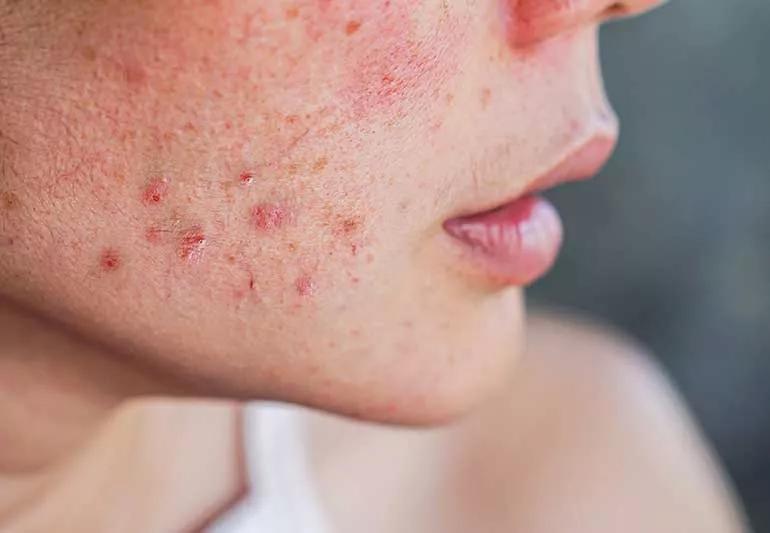Hormone fluctuations impact oil and sebum production, creating painful, tender pimples

Image content: This image is available to view online.
View image online (https://assets.clevelandclinic.org/transform/465db1e2-2c68-4468-ad2f-a0cc9240ddb8/Hormonal-Acne-Period-1270415883-770x533-1_jpg)
woman with hormonal acne along cheek and jaw
There are many different ways to track your menstrual cycle, some high tech, others … not so much.
Advertisement
Cleveland Clinic is a non-profit academic medical center. Advertising on our site helps support our mission. We do not endorse non-Cleveland Clinic products or services. Policy
And for some of us, all we have to do to know where we are in our cycle is to look in the mirror. Thanks to our hormones, our complexion doubles as a calendar. Zit marks the spot … but why? And is there anything you can do to stop it?
We talked to gynecologist Niccia diTrapano, MD, about period pimples: What they look like, where and when you’ll find them — and what you can do to prevent them.
According to Dr. diTrapano, “Hormonal acne often forms painful cysts or papules that are deeper — and more painful — than your typical whiteheads or blackheads.”
In many cases, hormonal acne never develops a head at all. It just sits there, mocking you, and leaving your skin tender to the touch.
Hormonal breakouts most often make their home on the lower third of your face — think chin and jawline. But Dr. diTrapano says that period acne can also take up residence on your cheeks, neck and around your mouth, as well as on your shoulders and back.
The menstrual cycle is not a fixed thing. It changes from person to person and month to month. For that reason, when exactly period acne starts — and how long it lasts — varies. “It can last for a few days or for a few weeks,” Dr. diTrapano says. “It impacts each person differently.”
Advertisement
“Your hormones fluctuate throughout your menstrual cycle,” Dr. diTrapano explains, “and that can lead to changes such as an increase in sebum production, which is the oil in your skin. That increase in sebum contributes to the formation of acne.”
The when of menstrual breakouts is a bit more complicated than the what. Many people experience breakouts in the lead up to their period — in fact, acne flares are one of the primary symptoms of premenstrual syndrome (PMS). The premenstrual period is when estrogen levels are lowest, and your progesterone levels are going up. Progesterone increases sebum production. But, as Dr. diTrapano explains, hormones fluctuate throughout your entire menstrual cycle.
For example, while we often think of testosterone as a “male hormone,” all people make testosterone. “Your skin may be more prone to react to testosterone,” Dr. diTrapano states, “which can cause hormonal acne at different points in your cycle.”
It’s worth noting that you can also experience breakouts during pregnancy or menopause, too. Yippee.
“Although it may not be completely preventable,” Dr. diTrapano says, “there are thing you can do to decrease your risk of breaking out.” Here are a few lifestyle changes that can make a difference:
Advertisement
Prevention’s great, but what should you do if you’re mid-breakout? We recommend the following to ease the pain and banish your blemishes faster:
Advertisement
Hormonal acne happens to everybody from time to time. But it can be especially obnoxious if you menstruate. If lifestyle changes and over-the-counter treatments aren’t keeping your period pimples at bay, consider speaking to a healthcare provider. They can discuss other options for acne management. They may even prescribe medications to prevent future flare ups.
Advertisement

Sign up for our Health Essentials emails for expert guidance on nutrition, fitness, sleep, skin care and more.
Learn more about our editorial process.
Advertisement
It’s best to avoid picking at zits, which can damage your skin (though there are ways to minimize the risk)
This medication only works well for short periods of time and when paired with other treatments
‘Zit stickers’ can help heal a new or popped pimple, but they’re limited when it comes to managing acne
Try exfoliating and using salicylic acid to treat this pesky skin care issue
Wear light, breathable clothing, shower after you exercise and change your sheets regularly
As you age, hormones can continue to play a big role in breakouts
Some remedies might help banish breakouts, but others are best avoided
Birth control pills with estrogen are best for fighting hormonal acne
Although it could be used as a moisturizer, this new trend is not recommended
Communicating clear limits helps protect your time, energy and emotional well-being
High cholesterol can be genetic, but testing and treatment can lower your heart disease risk